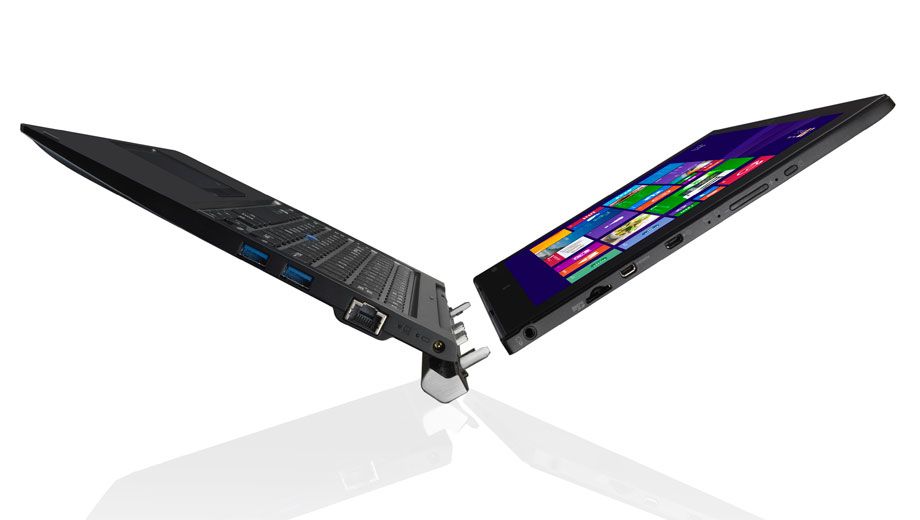What Intel's 6th Gen Core chips mean for your next notebook

TECH | Get ready for a whole new world of whiz-bangery as the latest Windows laptops, tablets and 2-in-1's shift over to Intel's family of '6th Gen' Core processors.
Officially launched this week, the latest Core powerplants (previously codenamed Skylake) will trigger a wave of fresh and refreshed hardware to tap into the chip's manyfold capabilities.
Some of those are precisely what you'd expect from a 2015 processor which follows five other better-than-before iterations of the Core-branded line, such as increased performance and near all-day battery life – and those alone could be all it takes to upgrade from your current years-old laptop.
And depending on the number of years on that notebook's clock, you could be in for a dose of 'shock and awesome'.
Take a five year-old Windows laptop for which you've probably already had to buy a replacement battery, while still pushing the processor and hard drive to their very limits.
Intel's benchmark numbers suggest the 6th Gen Core – specifically, the mid-market Core i5 – will deliver triple the battery life alongside a 2.5x performance boost compared to the equivalent circa 2010 chip.
Of course, I'd hate to think that any Australian Business Traveller reader - indeed, any business traveller per se – would still be carting around such a clunker.
Three years seems closer to the norm when it comes to trade-up time, but even then there's quite a gap between that laptop and the soon-to-be-launched models when it comes to battery life and performance.
Starts faster, runs longer
The 6th Gen Core processors are also engineered for a fast-start mode which can trim boot time to seconds, especially if you've opted for one of the Ultrabook machines with a solid state drive.
Marry that SSD to the 6th Gen Core's low power consumption, which in turn means the chips run cooler so there's less need for fans to push hot air out from the laptop's innards, and you also get super-slim and lightweight 'fanless' designs.
Joining the dots, fan-free means laptops which run quieter and for even longer between recharges.
There's also support for fast wireless beaming of video to a projector, monitor or TV; 'Speed Shift' to quickly kick in extra processing muscle when it's needed; and, if the laptop's got an Intel RealSense Camera and running Windows 10, secure log-in using facial recognition.
(While talking operating systems, expect the 6th Gen Core products to also make their way into the next update to Apple's MacBook line.)
There's also what the boffins call 'Thunderbolt 3 for USB Type-C', which has already made its debut on the most recent MacBook Air: a one-socket-does-it-all approach to power, connectivity and expandability.
Also read: Apple, Google lead the push for 'universal' laptop charger
The biggest gains for road warriors appear to have come from the Core M chips, which will find their way into the skinniest notebooks (such as the insanely wafer-thin 12 inch MacBook) as well as some convertible 2-in-1 models with up to 10 hours' battery life plus a decent performance whack.
Decision time..
So should you hold off on buying a new Windows laptop or tablet until it's got a 6th Gen Core powerplant parked under the hood?
My rule has always been that if you need a new machine right now, then you buy it right now.
But if you can wait, you'll almost always find a better value down the road a bit – be it a new system for as much as you'd pay now, or one of today's models at a reduced 'end of line' price.
That said, my take is that most business travellers will want a 6th Gen Core in their next laptop.
Starting this week, Australian Business Traveller will be introducing more content on technology for the business traveller – incuding gear that makes life better even when you're not on the road.
Follow Australian Business Traveller on Twitter: we're @AusBT

QF NZ
28 Jul 2013
Total posts 29
David, this is great, one thing I have noticed is that a laptop with a SSD is much quicker and less power hungry. The early SSDs were quite small 128GB but the newer ones hit 256GB which should be suitable for normal business needs. For music, photos and movies get an externall hard drive.
QFF
12 Apr 2013
Total posts 1518
I have 512G SSD for few years and yes, this is one of the best upgrades ever.
QFF
12 Apr 2013
Total posts 1518
I am in IT for 30+ years and all those years I see that hardware became better and faster (especially so after 2000) and today even weakest laptop thousands times (literally!) faster than top self server in mid 90. However software killing everything and in reality modern computers do not work any faster then 20 years ago, IMHO they even slower. So do not hold your breath – Microsoft and Co found the way to put your new laptop on knees and you start thinking about upgrade in 1 year time. I am still using XP on quite aged hardware (one of the first i7) and my laptop just fly.
14 Jun 2013
Total posts 353
I often feel that XP was the sweet spot in terms of efficiency for a modern Windows OS, especially once you wound back the effects and give it more of a Windows 2000 UI. But I can't agree that "modern computers do not work any faster then 20 years ago". Try running Photoshop, doing photo editing, video editing, gaming, music transcoding, HD video playback or one of scores of other tasks on today's laptop versus a laptop from 1995!
QFF
12 Apr 2013
Total posts 1518
Mal, hardware DOES run faster and a lot faster! But lousy software killing everything. Why the heck simple service need to gulp more than 1G or RAM? This is exactly what happened to one of my client. Do you have any idea how much is 1G actually? It is about a thousand quite thick books! My point is very simple – while hardware people doing excellent job, software guys bog themselves in “cool” stuff completely ignoring performance. Result is simple – we not working any faster today on computers than we did 20 years ago. We just shifting far more cr@p around and shifting it very fast.
14 Jun 2013
Total posts 353
"Result is simple – we not working any faster today on computers than we did 20 years ago". I can certainly edit photos and videos and do DTP layouts a lot faster today than on a PC from 1995.
Virgin Australia - Velocity Rewards
13 Jan 2014
Total posts 122
This is because those pieces of software are designed to work well on multi core/multi threaded machines. The problem with the current hardware race is that they are cramming more and more cores in with more threads of execution. A lot of programs just are not designed to work that way matter of fact some programs might actually slow down with more threads due to contention. I don't buy into sergs pessamism but it is the general reason why hardware gets faster and faster and some things appear slower or not much faster.
QFF
12 Apr 2013
Total posts 1518
Mal, it is nothing to do to actual performance. Jared has a point – they cramped more and more cores and design benchmark tests to utilize those cores, but in reality it getting difficult to make some things running in parallel effectively. Payment for multicore environment is huge competition for resources – mainly RAM and for lesser extend I/O channels. So while in theory hardware is really fast software so badly designed that it barely utilizing all those superfast hardware. I continuously doing my own benchmark tests in database applications (MS SQL server, that one of the best multithread program from Microsoft) and old Pentium 5 single-core double-thread processor is still unbeatable. You doing your photo and video faster not because you using better software, but because of sheer hardware performance, mainly enormous amount of RAM available today. Install 8G of RAM in Pentium machine (if I not mistaken Pentium was on market before 2000) and you will be amazed. Even more so with program that been design to work fast enough with limited amount of RAM – they start flying.
Once again – IMHO modern hardware is marvel while modern software is rubbish. YMMV of course.
Hi Guest, join in the discussion on What Intel's 6th Gen Core chips mean for your next notebook